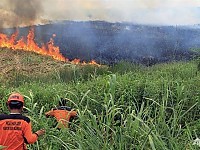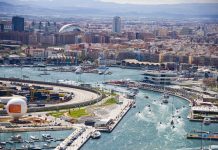This post may contain affiliate links. We may earn money or products from the highlighted keywords or companies or banners mentioned in this post.

Any traveler to Indonesia or any other South East Asia country will confess that it is the beauty of the natural habitat that is always the main attraction. Unfortunately, this is rapidly changing as a result of man-made environmental disasters. Many countries in South East Asia with Indonesia in particular, have seen the natural habitat and huge forests being cleared either through fire or cutting to give way for palm oil of paper products.
The man-made forest fires, which started some years back in dense forests of Kalimantan and Sumatra, have turned into one of the most controversial environmental disasters that are definitely putting the area’s tourist attractions on the no-go list. The production of toxic fumes and smog from these fires has not only destroyed the beautiful habitat, but has also negatively affected the lives of locals who have been evacuated and schools closed due to the dangers that they are exposed to.
Countries such as Indonesia, Malaysia and Singapore have been drastically affected by these unscrupulous activities that are now leaving negative effects on tourism in the region. Starting with events being cancelled, transport disruptions, and ending with warnings from Global Warming organizations such as Greenpeace, these fires are having negative effects on the lives of locals as well as the profits of businesses.
Known worldwide as a tourist hotspot, every area of the South East Asia including the south of Thailand are now feeling the pinch of the dangerous forest fires. The livelihoods of many locals who rely on tourism revenue have also been placed in jeopardy as a result of the fogs that arise from the fires. Many first world countries such as the UK are now warning their citizens against traveling to these areas otherwise they might face the risk of having their health affected. ¨
Thai tourism authorities have even began warning backpackers and other holidaymakers against traveling in areas such as Phuket for the fear that smog is a real health risk. A number of flights have also been cancelled with poor visibility and landing impairment being cited. This means that many people will be highly reluctant to explore local tourist attractions and those who brave these condition may face far-fetching health consequences.
December, which is always a high season for Thai tourism is fast-approaching, but the results may not be encouraging. This is a period of time when tourists from all over the world flock the beautiful country, but this may not happen if the situation does not improve. Sites rich in tourist attractions such as Phuket and Koh Samui are likely to suffer the effects of smog, which do not appear to end any time soon.
On its part, Indonesia recently agreed to allow international help in putting out forest fires, a step that may positively reverse the situation. Even though the damage is already done, there is still hope that South East Asian tourism sector will stand these trying times and surge again.










